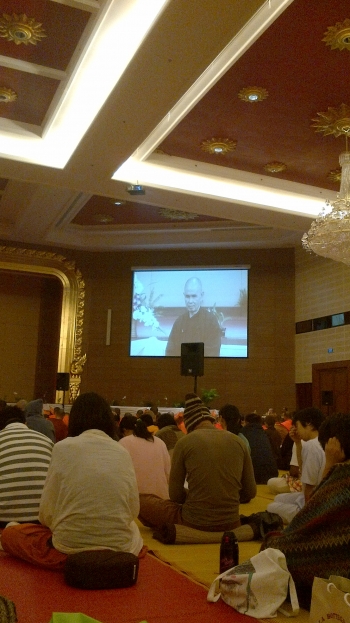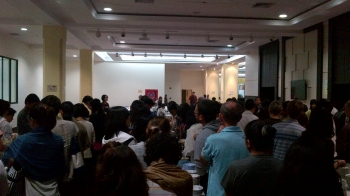This series of questions and answers was recorded on 07/04/2013 for Thay's third dharma talk at his Schools and Educators' retreat in Thailand, April 2013. Here he answered questions from people who sought help with not only their personal issues, but their professional problems in teaching. Commonly discussed topics included involving young people in mindfulness practice.
Q: When we are trying to practice deep listening, but the subject directs violent speech and harmful words that hurt themselves and others, how can we remain listening deeply?
A: The purpose of compassionate listening is to help the subject suffer less. If they are full of suffering it may be hard for them to use loving speech. There is probably much bitterness, pain, violence, disappointment, and irritation in their hearts which manifest as harmful words and moods. So you must remember one thing while you are listening: this person is full of suffering. I am listening to help him or her lessen their suffering. This mindfulness has two aspects: first, see the suffering inside the subject, and then recall the purpose for which we are listening. While listening, use these reminders and this energy of compassion to protect yourself from harmful speech. Harmful words will not leave a lasting scar on you if you do so. If you lose your compassion, do not force yourself to continue listening lest you forget and lose your protection. Ask for another day to listen deeply, when you are not drained of compassion and empathy.
Q: There is a man who has been hired to do some training. He uses language that is derogatory against women, towards people of different ethnicities. I find this very difficult to listen to. My question is, how can I express to him in loving ways my discomfort with his behaviour and language?
A: I don't think that you have to change his way of talking. You need to change your way of listening. If you see his suffering, and how he is directing his suffering, you can listen to anything he is saying and not get irritated. If you listen with compassion, people tend to gradually change their way of speaking on their own, and you don't need to tell him to do so.
Q: I work with hill tribe villagers, and they have to harm and kill animals for food and cut down the forests, contributing to global warming - their parents' livelihood depends on the destruction of life. How can I teach their children practical ways to respect life?
A: If you can cook something vegetarian for them to eat, that would be very good. And they may hopefully change their eating habits gradually. You should find ways to concretely show them the suffering of living beings, perhaps a film or documentary of animals being eaten by predators, and they will feel the pain of animals' mothers. That is more educational than a dhamma talk or an abstract ethical admonition. You could create a vegetable garden and grow biodegradable produce, and invite them to cultivate the garden with you. A garden is not only sustainable and provides vegetables to eat, but can also educate children about alternative ways of living. Show them love is possible with eating organic food, and we need not consume dead animals for food. A person who loves is a happy person. So organize this and you can succeed.
Q: We want to apply your techniques in our school, but the headmaster or director does not allow or permit this teaching. How can we implement the teachings without being fired?
A: There are many ways to bring the teaching into your school. The best way is to incorporate mindfulness teaching into the classroom in a skilful, subtle way. If we invite students to start the class with mindful breathing, who can stop us? We should let people notice the changes in our class. If the class does better, behaves happier, people may begin to notice. Suppose you lead a total relaxation session; no matter how long, it will surely have an impact on the class. We should also find the time to approach the principal and other teachers and discuss how to improve the students' wellbeing, and how something must be done. When a schoolteacher practices mindfulness, everything about her changes, and people will notice and ask about the peace in her. When others see it, they will not try to prevent your peace. If you do not enjoy this peace of mindfulness, you will not be able to teach it in the classroom. Or you could write an article about the benefits of practice and share it with your colleagues and superiors. There is much evidence to show how mindfulness has benefited schools.
Q: I have suffering but when I try to escape this root of suffering, students come to me to seek help with their own problems, and then my mother calls me on the phone to say that my father wants to harm her. How can I handle suffering from three sources at once?
A: I would try to listen to your students and mother's suffering, but I think we need to handle one first! So it is very clear you need to tell your mother first that you will discuss with her, reflect on the problem, and call her back. This is quite logical. In order not to be overwhelmed by so many things at the same time, we need to learn to nourish ourselves so we are strong enough to handle multiple problems.
There are two things: first, learn how to handle suffering and second, learn how to nourish happiness. You must learn how to heal and fortify yourself. I must repeat the example of walking to school: walk in such a way that you can nourish yourself. Doing any everyday act, practice so that daily life becomes nourishing. When daily life nourishes you, you will have enough strength and not be overwhelmed by multiple problems. If a doctor sees that a patient is too weak to undergo surgery, he will postpone surgery to help the patient get stronger first. Learning how to live happily in every moment is very important to reduce suffering. When you open the water tap, you feel happy. When you brush your teeth, you feel happy. Learning to appreciate and enjoy all these daily basic things is vital, and mindfulness keeps you alert to suffering and solutions.
Q: When I practice, there is indeed some transformation, but the benefits do not remain. I can see my anger arising and let it go, for example, but I've only done so twice, and I feel very discouraged. How can I keep the fruits of my practice?
A: If you force yourself to breathe in, thinking this is automatically good, this is not wise practice. If you begin breathing in a way that makes you happy and at ease in the first three or four seconds, this is wise practice. Don't force practice it suffer through it. The Buddha said the Dhamma is lovely in the beginning, middle, and end. You should feel calm and happy throughout breathing in, not just at the end. So abandon the practice is the means, and happiness is the result of this practice. Happiness isn't a destination but a way. There is no way to relaxation, relaxation is the way. You can't force yourself to relax! Good practice is when you are not suffering during practice! If you suffer during walking meditation, that is not good practice. If you breathe in and out to the bell and feel suffering, that is not good practice. Enjoy your practice, and there won't be this question!
Q: Some of us live in very busy cities, so when we get a chance to practice in the temple, we find it very hard to follow. When we return to the city, the teachings are hard to keep and remember.
A: It is easier to practice as a monk than a layperson. When you live in a community of monks you are protected in an ideal environment. So preserving the teachings and precepts is easier when you are in a community of monastic brothers and sisters. The Buddha always brought a lot of monks with him because he understood this reality. We are just imitating the Buddha by bringing as many experienced monastics and lay practitioners! If you want the practice to be easy, become a monk!
If not, you must set up a lay sangha wherever you are. In the city, a lay sangha replaces the temples monastic sangha. That is why a retreat like this can inspire people to continue their practice by setting up or finding a sangha. Usually, they find this on the latest day of the retreat, especially those who live in the same city. Many lay sanghas have been established in the world. In Germany, there are more than 80 lay sanghas practicing in the PV tradition. In the UK, there are perhaps 100. In cities like London and New York, there can be as many as 10. So when you go home, ask around, get together a group once a week to walk mindfully together, eat mindfully together, listen to a dhamma talk together. I always practice walking meditation at the train station or airports. If I go to the supermarket, I do the same! When you do walking meditation there, you know what to buy and what not to buy! Sometimes I walked out of the supermarket not buying anything! This is applied Buddhism that you can practice in society.
Q: How can children and grandchildren reconcile with parents or grandparents that have hurt or abused them? They want to love their elders, but the wounds are just too strong.
A: When our father suffers and does not know how to handle the suffering, he transfers this to us. So looking into our suffering, we can see the suffering of our father. If we do not transform this suffering, we will also transmit it to our children. This is the samsara of suffering. Usually we think our father is outside of us, that he is another person. That's not true; he is inside us, fully present in every cell of our body. The happiness and suffering of every cell in our body is our father's too. If we do not transform our father's suffering in us, we will make the people we should love the most suffer too.
We should not seek to change the father outside of us without changing the father inside us. We must remember we are the continuation of our father. We are bringing our father into the future. So every time you walk, invite your father within to join so he can enjoy the wonders of life and be transformed in you. Enjoy a cup of tea with your father inside you, so he can be transformed inside you. It is easier to change your father in you first, before focusing on the father outside of us. We can transform our internal father into a loving, joyful, and compassionate person, and end the samsara of our father in us. Then we will be in a position to help the father external of us to change. But not before, because an angry internal father confronting an angry external father can't lead to much! I have seen children going back to help their parents. Taking refuge and the five precepts is the best path of healing and transformation.
Back to Plum Village Schools and Educators' Retreat, April 2013 special edition homepage
Back to Plum Village Schools and Educators' Retreat, April 2013 special edition homepage


















